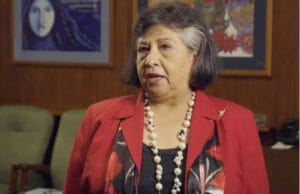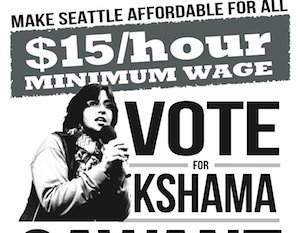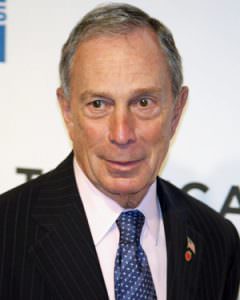Truthdigger of the Week: Kshama Sawant
By winning a seat on Seattle's City Council this month, the socialist has given her fellow citizens one of the best opportunities in living memory to determine their individual and collective futures. Will city residents make good on it?By winning a seat on Seattle's City Council, the socialist has given her fellow citizens one of the best opportunities in living memory to determine their individual and collective futures.
Every week the Truthdig editorial staff selects a Truthdigger of the Week, a group or person worthy of recognition for speaking truth to power, breaking the story or blowing the whistle. It is not a lifetime achievement award. Rather, we’re looking for newsmakers whose actions in a given week are worth celebrating. Nominate our next Truthdigger here.First they ignore you, then they laugh at you, then they fight you, then you win. — Mahatma Gandhi
The election of Kshama Sawant to the Seattle City Council this month has some of the city’s residents ill at ease. People I met in bars, restaurants and retail shops wondered aloud whether the socialist and Occupy Seattle activist understood the need for balance and compromise in her upcoming work alongside eight politically mainstream peers. At her campaign headquarters Thursday, inside Seattle’s spottily impoverished, multicultural Central District, Sawant assured me she takes these concerns seriously. She welcomes compromise by the city’s wealthiest residents, she said — executives of Amazon, Microsoft and Starbucks among them — for the sake of making life for their working and poor fellow citizens a little more bearable, dignified and secure.
“We are constantly making compromises, we as working people, as elderly, as disabled, as students and low-wage workers,” Sawant told me. Right now, “compromise defines our life. … [We] need to actually stop compromising. … If people want to feel empowered, then they have to see this from another angle.”
For those who fall within or sympathize with Sawant’s categories of the dispossessed, her pugnacious tone should come as a welcome addition to the left side of American politics. In the past two decades, the Democratic Party — whose meritorious actions during the 20th century included the passage of Social Security, the Glass-Steagall prohibition on destructive banking and the Civil Rights Act — exported nearly three-quarters of a million manufacturing jobs, tore down Glass-Steagall’s time-tested protections, delivered a percentage of millions of Americans’ incomes to health insurance corporations, and expanded and strengthened the military-industrial complex’s domestic prerogatives, among other things. Democrats have long been aligned with Republicans in the effort to help corporations rob the public, and Sawant’s victory over a 16-year Democratic incumbent by a difference of more than 1,000 votes provides evidence that their abandonment of common people has created opportunities for different political ideas to take hold.
Sawant knows this intuitively. Raised in Mumbai, India, in neither excessive wealth nor poverty, she had enough chances to witness the horrors of inequality directly. “It wasn’t just a question of feeling outraged,” she told me, describing the experiences of her childhood, “it was also a logical question: How is it possible that human society hasn’t figured out a way of eliminating this enormous misery that is unleashed on billions of people while there is clearly so much wealth?” Why the persistence of “extreme degradation and indignity that is foisted upon people with no choice? … Even now I feel like the same child that I was that just basically felt it unbearable to think of any human being subject to that without crying out in outrage.”
I asked her to recall a specific instance that prompted this recognition. “I used to take the bus and the train on a regular basis,” she said. “I remember one time I was coming out of the train station. I was walking outside to the bus stop where I was going to take the bus back to my house. I remember this woman, an older woman who was begging for alms on the side of the street.” At this point Sawant stopped to clear her throat. She turned her eyes to the table between us. “And she, you know, she was completely damaged from leprosy.” She stopped again. Reaching into her pocket, she pulled out a tissue which she pressed to her watering eyes. “And um, I carry that image with me everywhere. And it’s so many years since that but I can never take it out of my — that image is burned on my brain.” She fell silent again. A few moments later she apologized for getting emotional.
This expression of grief struck me as genuine. Some politicians have a habit of crying in public, and when they do, large portions of the public approve. But my Internet searches turned up no similar routine for Sawant. She is not a career politician. After spending years working as a computer engineer, and then, after a period of studying, an economics professor at Seattle University and Seattle Community College, Sawant was selected to run for council by a vote of her peers in Socialist Alternative, the political party with which she is aligned. She became a socialist after hearing a speech by one of the group’s organizers in 2006 at age 33. It was the same year she moved to Seattle. Her cobbled path to political office bespeaks a character committed to understanding and driven by compassion. Contrary to the view of selfishness as a virtue under the dubious title of “personal responsibility” — a view held by the vast majority of America’s political leaders — Sawant told me she believes that fundamentally, “compassion is a state of being for humanity.”
I have yet to conduct a formal poll, but my own conversations and experiences across numerous cities over the past 15 years lead me to suspect that view is foreign to many, if not most Americans. The same is probably true of the general population of Seattle, and there is a central issue on which the success of Sawant’s leadership hangs. The socialist councilwoman is a rookie contender in a ring of veteran political animals, all of whom have spent long careers gruesomely fused to a single corporate-funded and consensus-driven partisan machine whose standard operation has molded its electorate into a posture of cynicism. Dominic Holden, a contributor to the local newspaper The Stranger, writes that the existing council fears Sawant will “be like a mountain lion set loose in a grocery store.” The expression of concern is rich. Sawant’s criticisms of the council are based on the facts of its cooperation with big business to adopt policy that deprives the public of its fair share of the fruits of enterprise enabled in many ways by tax dollars. No, Sawant’s future colleagues fear the absence of loyalty inherent in her outsider status, and her willingness to use her bully pulpit to loudly tell the truth as she sees it. Their branding of her as a rigid ideologue intent on tearing the chamber apart is intended to exploit the common public belief that politics is limited by whatever already is and is not amenable to the actions of large numbers of determined and imaginative people working in concert with a well-placed leader.With Sawant’s election, it appears that Seattle residents have never had a better chance at determining their future. But they cannot treat Sawant as a conventional politician, or as the rest of their elected leaders have generally treated them — as dissociated individuals left to fend for themselves. To stick to the principles that distinguished her campaign — increased taxes on the rich, housing cost controls and a citywide $15 an hour minimum wage — Sawant will have to be a fundamentally different kind of political leader. Her success will still require her to get along with her colleagues, but her capacity to do so in the service of her causes will depend entirely upon whether enough of her constituents stand with her. Sawant knows she has no chance of accomplishing anything on her own. She will succeed or fail in direct proportion to the public’s continued participation in her campaign. City leaders will be forced to listen to her if thousands of people show up every time she endorses an initiative. If they don’t, they risk painting a clearer picture of their disinterest in the public interest. The push for a $15 minimum wage is one of the first priorities on Sawant’s agenda. She points to the struggle by workers at the Seattle-Tacoma airport to gain the support of voters in that measure as one of noble the models for more gains. Across the city, those who want such improvements have a shot at getting them. But only if they continue to overcome the inertia and cynicism that infects American politics everywhere, just as they did by putting Sawant in office.
It’s better to let the councilwoman-elect state her purpose in her own words. As she said to me, “We don’t have any naive idea that simply getting one voice in city council will solve all the problems in Seattle. No, if we’re to do any of the things we’re trying to do, we need masses of people to be involved in the political struggle.
“We will help to play a role in raising the confidence of working people everywhere and realizing that we have a lot of power in our hands and we can change, make change happen if we get organized,” she continued. “It’s not automatic. It’s not good enough to want it. You have to organize. You have to make a sustained and conscious and strategic effort to make that change.
“We have to build our side. We have to build the force and that is going to come from actively energized and politicized working people. Fast food workers, child care workers and everybody who needs a living wage has to come out and demand their right. … We are only limited by our own diffidence.”
Finally, she offered this simple and profound expression of democratic virtue, which is mouthed by leading politicians in various ways but almost never credibly said, and which, given the power and determination of the forces arrayed against her, should influence the way observers measure success in her first administration: “The benchmark [for our success] is how many people we succeed in empowering so that they become part of a process that determines their own destiny.”
After it was brutally dispersed by local governments around the country — sometimes with federal help — the Occupy movement was ridiculed as ineffective and broadly pronounced dead. But the pervasive need that underpinned that movement still exists, and Sawant’s election to Seattle’s City Council by a majority of the city’s voters gives it new, undeniable legitimacy. Those who oppose Occupy’s core goals — a society in which the needs of the vast majority of people are prioritized over the profits of a small number of corporations, and a democratic process capable of holding officials accountable — will deny the significance of any measurable progress that hits against their interests. Bizarrely, in the same breath in which they acknowledged the unheard of event of the election of a socialist to city government, some of the people I spoke with in Seattle suggested that victories by the genuine left-wing in city government were impossible. By electing Sawant, Seattle voters showed they know better. They now have two years to confirm their commitment to themselves.
Career politicians culled from the upper class merely say they want citizens to participate in government. They don’t. Neither do their friends at Goldman Sachs, or Amazon, Microsoft and Starbucks. Kshama Sawant didn’t take a dime from corporations for her campaign, and the whole of her actions so far cast her as a genuine people’s politician. For helping to empower her fellow citizens to take control of the political forces that shape their lives, and in a manner that proves the traditional process of politics is not dead, we honor her (and by extension, the entirety of her hardworking campaign team) as our Truthdigger of the Week.
Your support matters…Independent journalism is under threat and overshadowed by heavily funded mainstream media.
You can help level the playing field. Become a member.
Your tax-deductible contribution keeps us digging beneath the headlines to give you thought-provoking, investigative reporting and analysis that unearths what's really happening- without compromise.
Give today to support our courageous, independent journalists.





You need to be a supporter to comment.
There are currently no responses to this article.
Be the first to respond.